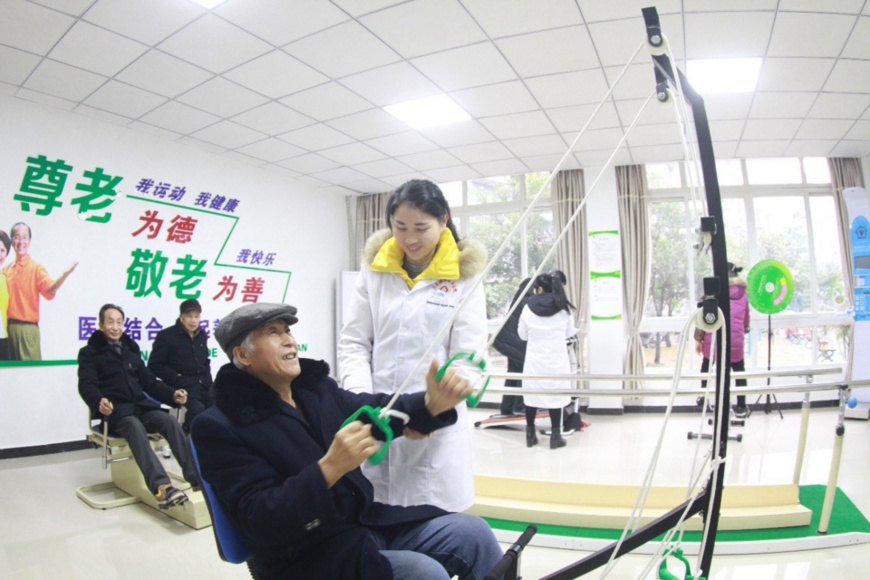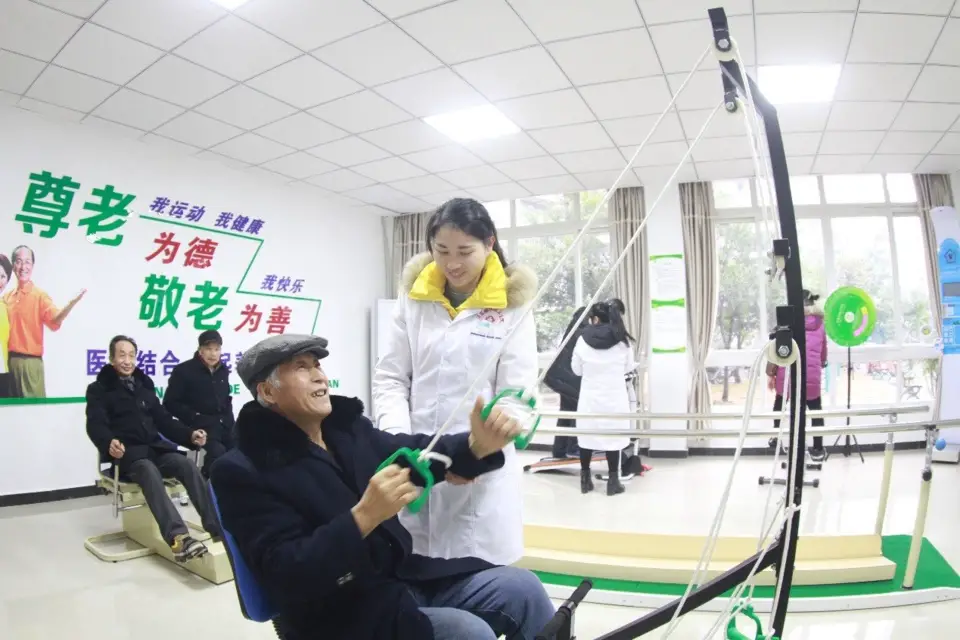By Du Yifei from People’s Daily

Several old men do physical exercises with the fitness and recovery equipment at a community-based elderly care service center in southwest China’s Chongqing, Jan. 18, 2018. (Photo from CFP)
China has developed a series of new models for eldercare to serve its increasingly ageing population.
Statistics shows there are more than 241 million people over the age of 60 accounting for 17.3 percent of total population. The ever-increasing elderly group puts pressure on both social governance and services.
China is exploring new concepts for eldercare by combining medical treatment with eldercare services, employing internet technologies, and launching intelligent old-age services.
By the end of November 2017, 93.4 percent of China’s eldercare centers had offered medical services in different forms. The rate of nursing beds at the centers rose to 46.4 percent from less than 30 percent in 2015.
An old-age care center in Yunyan District, Guiyang city, southwest China’s Guizhou province turned its single mode of elderly care into a comprehensive one, in collaboration with the local government and a nursing vocational college.
The center now incorporates professional nursing care, chronic disease management, rehabilitation, psychology nursing, hospice care as well as home- and community-based services (HCBS).
In addition, an open, convenient and shared online old-age care service platform with off-line services is also set up, to provide senior citizens with access to a great variety of services at the press of the button.
The services provided on the platform encompass making family calls, emergency rescue, medical consultation, health management, hospital appointment, registration and housekeeping.
Some of the platforms also provide customized services such as real-time data collection and monitoring of locations, physical signs and mobility of the elderly, thanks to the gradual maturity of wearable devices, Internet of Things, and wireless sensing technologies.
Not long ago, Chinese e-commerce giant Alibaba launched a pilot project of smart nursing homes in Beijing, in the hope to tackle problems in eldercare services using artificial intelligence technologies.
In the experiment room, the elderly, without getting up, can control equipment such as air conditioner, television and window curtain, and can adjust indoor temperatures and humidity through speech recognition.
China’s aging population is projected to reach 480 million in 2050, and their potential consumption is estimated to grow to 106 trillion yuan ($17 trillion), or 33 percent of the country’s GDP.
China plans to completely open its elderly care market by 2020 and ease its access restrictions for foreign investment in the market.
Statistics shows there are more than 241 million people over the age of 60 accounting for 17.3 percent of total population. The ever-increasing elderly group puts pressure on both social governance and services.
China is exploring new concepts for eldercare by combining medical treatment with eldercare services, employing internet technologies, and launching intelligent old-age services.
By the end of November 2017, 93.4 percent of China’s eldercare centers had offered medical services in different forms. The rate of nursing beds at the centers rose to 46.4 percent from less than 30 percent in 2015.
An old-age care center in Yunyan District, Guiyang city, southwest China’s Guizhou province turned its single mode of elderly care into a comprehensive one, in collaboration with the local government and a nursing vocational college.
The center now incorporates professional nursing care, chronic disease management, rehabilitation, psychology nursing, hospice care as well as home- and community-based services (HCBS).
In addition, an open, convenient and shared online old-age care service platform with off-line services is also set up, to provide senior citizens with access to a great variety of services at the press of the button.
The services provided on the platform encompass making family calls, emergency rescue, medical consultation, health management, hospital appointment, registration and housekeeping.
Some of the platforms also provide customized services such as real-time data collection and monitoring of locations, physical signs and mobility of the elderly, thanks to the gradual maturity of wearable devices, Internet of Things, and wireless sensing technologies.
Not long ago, Chinese e-commerce giant Alibaba launched a pilot project of smart nursing homes in Beijing, in the hope to tackle problems in eldercare services using artificial intelligence technologies.
In the experiment room, the elderly, without getting up, can control equipment such as air conditioner, television and window curtain, and can adjust indoor temperatures and humidity through speech recognition.
China’s aging population is projected to reach 480 million in 2050, and their potential consumption is estimated to grow to 106 trillion yuan ($17 trillion), or 33 percent of the country’s GDP.
China plans to completely open its elderly care market by 2020 and ease its access restrictions for foreign investment in the market.
 Menu
Menu
 China explores new ways for eldercare
China explores new ways for eldercare
















